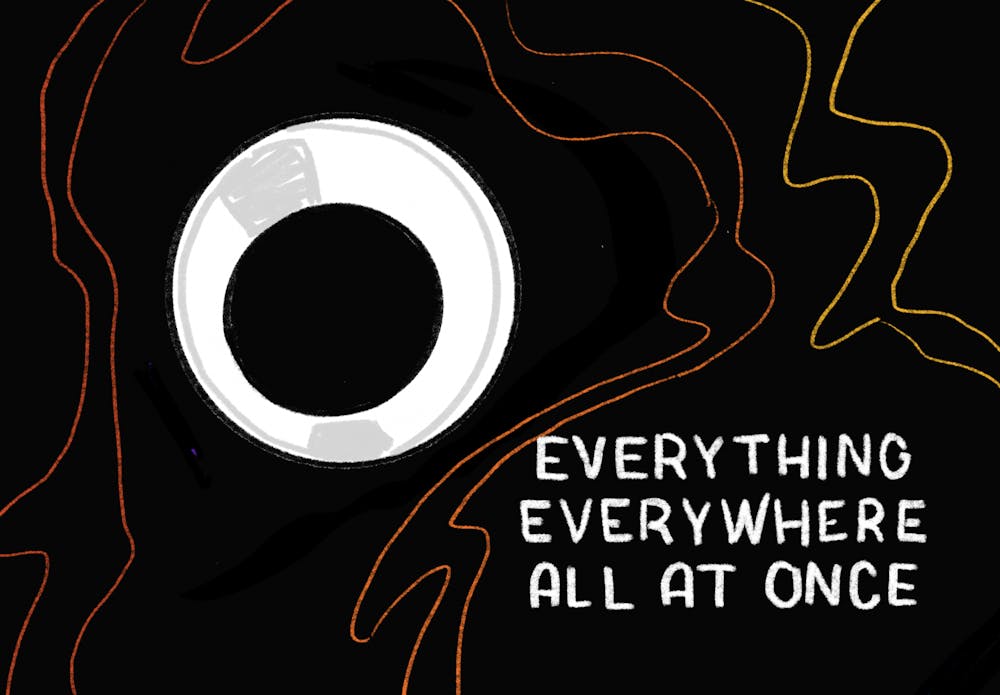For the past few weeks, one multiverse movie, where the fate of all universes is actually at stake, has been receiving more hype and acclaim than anything else out there. Led by an internationally recognized star, it’s flashy, making big bucks, and includes a fair amount of CGI. I’m talking, of course, about Everything Everywhere All at Once, although I did hear about some small, obscure Marvel multiverse film coming out soon, too.
Yes, if there’s one movie centered on the multiverse—a concept where an infinite number of parallel universes exist—it’s got to be Everything Everywhere All at Once. It’s tough to pinpoint exactly what this movie is; It’s fun, weird, loving, tender, epic, devastating—did I mention weird? It’s much easier to say what this movie isn’t: unoriginal. There’s never been a movie like Everything Everywhere All at Once, a multiverse movie with a bonkers storyline, yet one that's still centered on universal family issues and firm in its creative vision.
It’s best to go into Everything Everywhere All at Once knowing as little spoilers as possible to maximize the moviegoing experience. But it might be helpful to have some background on the characters and settings before the movie begins hurling through parallel universes at the speed of light.
Evelyn Wang (Michelle Yeoh), who was disowned by her father for leaving China with her husband Waymond (Ke Huy Quan), now lives an often–stressful, mostly underwhelming life running a laundromat in America. But the laundromat isn’t what stresses Evelyn out the most—it’s her family. Evelyn’s elderly father (James Hong) has come to America to celebrate his birthday, Waymond is filing for divorce, and Evelyn is struggling to deal with her daughter Joy’s (Stephanie Hsu) angst and sexuality. Not much epic about it, right?
But fear not, he film really kicks into high gear when Evelyn, Waymond, and Evelyn’s father visit an IRS officer (Jamie Lee Curtis) at her building, as Evelyn’s business is being audited. From there, a version of her husband from a parallel universe appears and tells Evelyn that she’s the only person who can save the universe. What follows is what you’d expect in an excellent multiverse movie: seamless travel through alternate versions of Evelyn’s life, which range from a Ratatouille spin–off to a glamorous martial arts movie star (which shouldn't have been too much of a reach for Yeoh, who is one herself). There are dozens of universes other than the main one where we first meet Evelyn and, unfortunately, we only get a sparingly quick time with most. To travel through the multiverse, the characters in the film must say or do the strangest actions to “verse–jump,” which range from sexual to absurd. This strangeness shouldn’t be a surprise from directors Daniel Kwan and Daniel Scheinert (also known as Daniels), as their past film, Swiss Army Man, had Harry Potter himself (Daniel Radcliffe) play a farting, flatulent corpse.
Despite the wacky and wonderful spectacles, this film is a family drama at its core. At times, it’s a marital drama like Marriage Story or a tender–yet–complicated mother–daughter story like Lady Bird. Frankly, the greatest multiverse aspect is the blending of dozens of genres, rather than of universes. All of these genres and storylines cohere into the theme of family being the most important part of our lives.
What holds Everything Everywhere All at Once through its occasionally confusing plot points are the stellar performances. The main actors really get to showcase their acting chops here, as they play dozens of versions of themselves, all of whom are uniquely different from each other. Already one of the greatest actresses of her generation, Yeoh delivers a career–defining performance that is insanely charismatic, graceful, and endearing. Quan, a child star in the 1980s, makes his return as an actor in this film, where he bounces effortlessly between being the comedic relief to the tragic and somber husband. But my favorite performance has to be Hsu’s Joy, who plays most of the badass characters in the film. She portrays Joy with a vulnerability that perfectly matches that of a Gen–Z adult who’s struggling to understand their identity and be accepted by their family. Joy and Evelyn’s relationship is a beautiful example of many rocky parent–child relationships: Despite the arguments and quarrels, everything is done out of love.
As much as this seems like a rave review, there were issues with this complex film. Given its running time of two hours and 12 minutes, the movie feels long. It’s particularly sluggish toward the end, where the Daniels could’ve easily cut 20 minutes. The ending, despite how insane most events throughout the movie are, is quite simple and predictable once the multiverse concepts come into play. I even started to doze off by the end because the third act felt more like everything, everywhere, for an eternity.
Even with its flaws, it’s impossible to not marvel at the cinematic achievements of this film. It’s rare to see such a fleshed–out original film, certainly one that’s making lots of money by arthouse film standards. So please, when Doctor Strange in the Multiverse of Madness is sold out or just playing in theaters, consider watching this multiverse movie instead. I promise you, Everything Everywhere All at Once is better.







